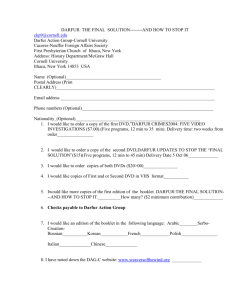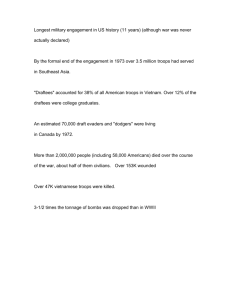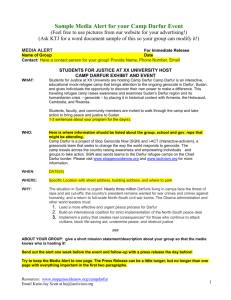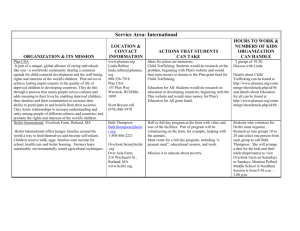Darfur_WP_021806_Bush
advertisement
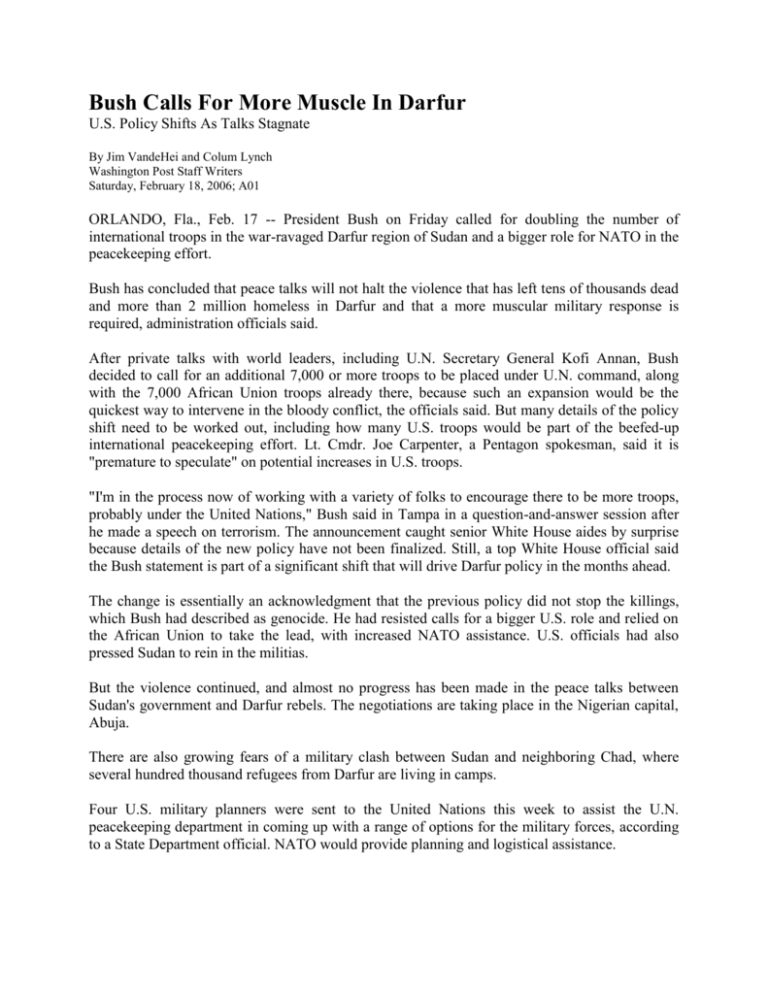
Bush Calls For More Muscle In Darfur U.S. Policy Shifts As Talks Stagnate By Jim VandeHei and Colum Lynch Washington Post Staff Writers Saturday, February 18, 2006; A01 ORLANDO, Fla., Feb. 17 -- President Bush on Friday called for doubling the number of international troops in the war-ravaged Darfur region of Sudan and a bigger role for NATO in the peacekeeping effort. Bush has concluded that peace talks will not halt the violence that has left tens of thousands dead and more than 2 million homeless in Darfur and that a more muscular military response is required, administration officials said. After private talks with world leaders, including U.N. Secretary General Kofi Annan, Bush decided to call for an additional 7,000 or more troops to be placed under U.N. command, along with the 7,000 African Union troops already there, because such an expansion would be the quickest way to intervene in the bloody conflict, the officials said. But many details of the policy shift need to be worked out, including how many U.S. troops would be part of the beefed-up international peacekeeping effort. Lt. Cmdr. Joe Carpenter, a Pentagon spokesman, said it is "premature to speculate" on potential increases in U.S. troops. "I'm in the process now of working with a variety of folks to encourage there to be more troops, probably under the United Nations," Bush said in Tampa in a question-and-answer session after he made a speech on terrorism. The announcement caught senior White House aides by surprise because details of the new policy have not been finalized. Still, a top White House official said the Bush statement is part of a significant shift that will drive Darfur policy in the months ahead. The change is essentially an acknowledgment that the previous policy did not stop the killings, which Bush had described as genocide. He had resisted calls for a bigger U.S. role and relied on the African Union to take the lead, with increased NATO assistance. U.S. officials had also pressed Sudan to rein in the militias. But the violence continued, and almost no progress has been made in the peace talks between Sudan's government and Darfur rebels. The negotiations are taking place in the Nigerian capital, Abuja. There are also growing fears of a military clash between Sudan and neighboring Chad, where several hundred thousand refugees from Darfur are living in camps. Four U.S. military planners were sent to the United Nations this week to assist the U.N. peacekeeping department in coming up with a range of options for the military forces, according to a State Department official. NATO would provide planning and logistical assistance. The latest conflict began in early 2003, when two Darfur rebel groups took up arms against the Arab-led Islamic government in Khartoum, citing discrimination against the region's black tribes. The Sudanese government armed and organized a local Arab militia, known as the Janjaweed, to target local communities that were suspected of sympathizing with the rebels. U.N. officials say as many as 200,000 people may have been killed by violence and disease as a result of the attacks. In a break from current policy, which has emphasized peace talks and long-term solutions, Bush concluded this month that the 7,000-member African Union peacekeeping force has been hamstrung by its size and limited rules of engagement, one official said. With memories of the failed 1993 U.S. military operation in Somalia fresh in their minds, many U.S. policymakers have been reluctant to commit U.S. forces unilaterally or through multilateral organizations such as NATO. But Bush brushed aside the resistance of some senior policymakers and sided with White House adviser Michael J. Gerson and others who have been lobbying for more assistance to Darfur. Bush this week also proposed $500 million for Darfur as part of a larger special budget request to Congress. There is some bipartisan support for intervening in the troubled region. Sens. Sam Brownback (R-Kan.) and Joseph R. Biden Jr. (D-Del.) plan to introduce a resolution in Congress calling for NATO troops to help the African Union "stop the genocide" in the Darfur region. The State Department official said there appears to be broad consensus at the United Nations to provide the force much broader rules of engagement. But he said that there are still many difficult issues to address, making it unlikely to win U.N. Security Council authorization by the end of the month. The United States holds the rotating presidency of the Security Council this month. The council's African members, Tanzania, Congo Republic and Ghana, backed by China and Qatar, do not want to discuss a U.N. peacekeeping mission until the African Union has formally indicated that it wants the United Nations to step in. That is expected to happen early next month. NATO has been providing airlift transport for the African peacekeepers, and there are discussions about enhancing that support during the transition to a U.N. mission, according to a British diplomat. Even if the council decides over the next month to approve a U.N. takeover, it could be several months before the mission would be in place. The Sudanese have not agreed to allow a U.N. peacekeeping mission into Darfur. A new, more effective force "will require a high degree of mobility in particular -- both in the air and on the ground," said Marie Okabe, a spokeswoman for Annan. "The United Nations plans to look to those countries that have the capacity to help us put on the ground a mobile, robust and effective force in Darfur." The U.S. European Command (Eucom) announced this week in Stuttgart, Germany, that U.S. airmen from Ramstein Air Base have begun helping with the logistics of moving 1,200 troops belonging to two Rwandan battalions from Kigali, Rwanda, to the Darfur region. Contracted aircraft started bringing the troops to the region last Saturday as part of a rotation scheduled to last about three weeks. Capt. Beverly Mock, a Eucom spokeswoman, said she was unaware of any specifics related to increasing U.S. troops in the Darfur region. She said plans are to continue supporting African troops. The U.S. military supported several missions in the region in 2004 and 2005, using its C-130s and contract aircraft to bring 2,500 Rwandan troops and more than 150,000 pounds of equipment and supplies to Darfur. Previously, the United States had helped send Nigerian troops and Rwandan civilian police officers to Darfur, along with providing about $190 million to build and operate 34 camps to house, train and equip African troops, according to the Pentagon. A U.N. or NATO mission supported by the United States would probably include more airlift capabilities, planners and logistics specialists, as well as leadership contingents, according to military officials. It was unclear how many U.S. ground troops, if any, would be included in such an effort. Lynch reported from New York. Staff writers Josh White and Glenn Kessler in Washington contributed to this report. © 2006 The Washington Post Company

